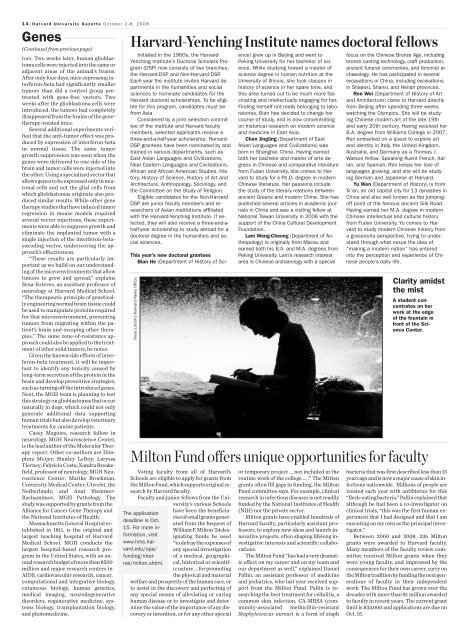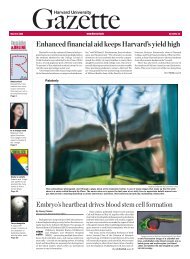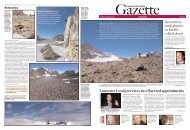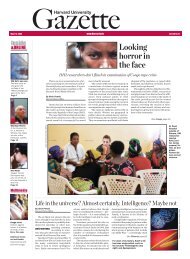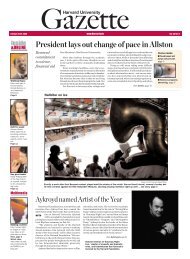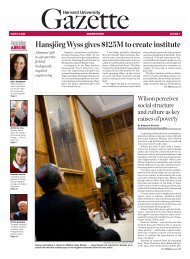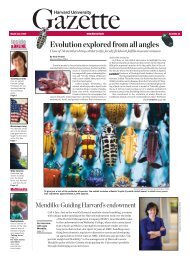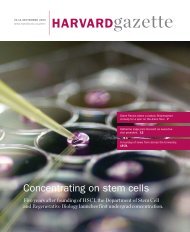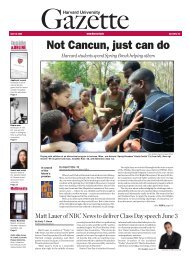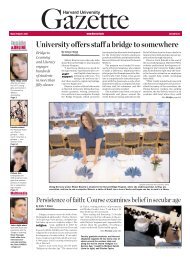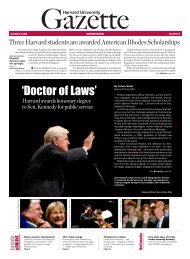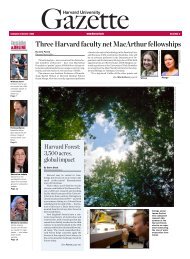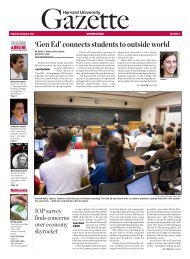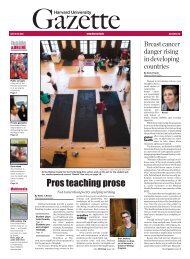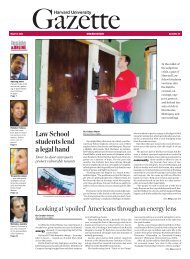Harvard University Gazette October 2-8, 2008 - Harvard News Office ...
Harvard University Gazette October 2-8, 2008 - Harvard News Office ...
Harvard University Gazette October 2-8, 2008 - Harvard News Office ...
You also want an ePaper? Increase the reach of your titles
YUMPU automatically turns print PDFs into web optimized ePapers that Google loves.
14/ <strong>Harvard</strong> <strong>University</strong> <strong>Gazette</strong> <strong>October</strong> 2-8, <strong>2008</strong><br />
Genes<br />
(Continued from previous page)<br />
tors. Two weeks later, human glioblastoma<br />
cells were injected into the same or<br />
adjacent areas of the animal’s brains.<br />
After only four days, mice expressing interferon-beta<br />
had significantly smaller<br />
tumors than did a control group pretreated<br />
with gene-free vectors. Two<br />
weeks after the glioblastoma cells were<br />
introduced, the tumors had completely<br />
disappeared from the brains of the genetherapy-treated<br />
mice.<br />
Several additional experiments verified<br />
that the anti-tumor effect was produced<br />
by expression of interferon-beta<br />
in normal tissue. The same tumor<br />
growth suppression was seen when the<br />
genes were delivered to one side of the<br />
brain and tumor cells were injected into<br />
the other. Using a specialized vector that<br />
allows genes to be expressed only in neuronal<br />
cells and not the glial cells from<br />
which glioblastomas originate also produced<br />
similar results. While other gene<br />
therapy studies that have induced tumor<br />
regression in mouse models required<br />
several vector injections, these experiments<br />
were able to suppress growth and<br />
eliminate the implanted tumor with a<br />
single injection of the interferon-betaencoding<br />
vector, underscoring the approach’s<br />
effectiveness.<br />
“These results are particularly important<br />
as we build on our understanding<br />
of the microenvironments that allow<br />
tumors to grow and spread,” explains<br />
Sena-Esteves, an assistant professor of<br />
neurology at <strong>Harvard</strong> Medical School.<br />
“The therapeutic principle of genetically<br />
engineering normal brain tissue could<br />
be used to manipulate proteins required<br />
for that microenvironment, preventing<br />
tumors from migrating within the patient’s<br />
brain and escaping other therapies.”<br />
The same zone-of-resistance approach<br />
could also be applied to the treatment<br />
of other solid tumors, he notes.<br />
Given the known side effects of interferon-beta<br />
treatment, it will be important<br />
to identify any toxicity caused by<br />
long-term secretion of the protein in the<br />
brain and develop preventive strategies,<br />
such as turning off the introduced genes.<br />
Next, the MGH team is planning to test<br />
this strategy on glioblastomas that occur<br />
naturally in dogs, which could not only<br />
generate additional data supporting<br />
human trials but also develop veterinary<br />
treatments for canine patients.<br />
Casey Maguire, research fellow in<br />
neurology, MGH Neuroscience Center,<br />
is the lead author of the Molecular Therapy<br />
report. Other co-authors are Dimphna<br />
Meijer; Stanley LeRoy; Laryssa<br />
Tierney; Fabricio Costa; Xandra Breakefield,<br />
professor of neurology, MGH Neuroscience<br />
Center; Marike Broekman,<br />
<strong>University</strong> Medical Center, Utrecht, the<br />
Netherlands; and Anat Stemmer-<br />
Rachamimov, MGH Pathology. The<br />
study was supported by grants from the<br />
Alliance for Cancer Gene Therapy and<br />
the National Institutes of Health.<br />
Massachusetts General Hospital established<br />
in 1811, is the original and<br />
largest teaching hospital of <strong>Harvard</strong><br />
Medical School. MGH conducts the<br />
largest hospital-based research program<br />
in the United States, with an annual<br />
research budget of more than $500<br />
million and major research centers in<br />
AIDS, cardiovascular research, cancer,<br />
computational and integrative biology,<br />
cutaneous biology, human genetics,<br />
medical imaging, neurodegenerative<br />
disorders, regenerative medicine, systems<br />
biology, transplantation biology,<br />
and photomedicine.<br />
<strong>Harvard</strong>-Yenching Institute names doctoral fellows<br />
Initiated in the 1960s, the <strong>Harvard</strong>-<br />
Yenching Institute’s Doctoral Scholars Program<br />
(DSP) now consists of two branches,<br />
the <strong>Harvard</strong>-DSP and Non-<strong>Harvard</strong> DSP.<br />
Each year the institute invites <strong>Harvard</strong> departments<br />
in the humanities and social<br />
sciences to nominate candidates for the<br />
<strong>Harvard</strong> doctoral scholarships. To be eligible<br />
for this program, candidates must be<br />
from Asia.<br />
Considered by a joint selection committee<br />
of the institute and <strong>Harvard</strong> faculty<br />
members, selected applicants receive a<br />
three-and-a-half-year scholarship. <strong>Harvard</strong>-<br />
DSP grantees have been nominated by and<br />
trained in various departments, such as<br />
East Asian Languages and Civilizations,<br />
Near Eastern Languages and Civilizations,<br />
African and African American Studies, History,<br />
History of Science, History of Art and<br />
Architecture, Anthropology, Sociology, and<br />
the Committee on the Study of Religion.<br />
Eligible candidates for the Non-<strong>Harvard</strong><br />
DSP are junior faculty members and researchers<br />
of Asian institutions affiliated<br />
with the <strong>Harvard</strong>-Yenching Institute. If selected,<br />
they will also receive a three-and-ahalf-year<br />
scholarship to study abroad for a<br />
doctoral degree in the humanities and social<br />
sciences.<br />
Rose Lincoln/<strong>Harvard</strong> <strong>News</strong> <strong>Office</strong><br />
Voting faculty from all of <strong>Harvard</strong>’s<br />
Schools are eligible to apply for grants from<br />
the Milton Fund, which supports original research<br />
by <strong>Harvard</strong> faculty.<br />
Faculty and junior fellows from the <strong>University</strong>’s<br />
various Schools<br />
have been the beneficiaries<br />
of small grants gener-<br />
The application<br />
deadline is Oct.<br />
ated from the bequest of<br />
15. For more information,<br />
visit ignating funds be used<br />
William F. Milton ’24 des-<br />
www.hms.harvard.edu/spa/<br />
any special investigation<br />
“to defray the expenses of<br />
funding/internal/milton.shtmlcal,<br />
historical or scientif-<br />
of a medical, geographiic<br />
nature … for promoting<br />
the physical and material<br />
welfare and prosperity of the human race, or<br />
to assist in the discovery and perfecting of<br />
any special means of alleviating or curing<br />
human disease or to investigate and determine<br />
the value of the importance of any discovery<br />
or invention, or for any other special<br />
This year’s new doctoral grantees<br />
Bian He (Department of History of Science)<br />
grew up in Beijing and went to<br />
Peking <strong>University</strong> for her bachelor of science.<br />
While studying toward a master of<br />
science degree in human nutrition at the<br />
<strong>University</strong> of Illinois, she took classes in<br />
history of science in her spare time, and<br />
this area turned out to be much more fascinating<br />
and intellectually engaging for her.<br />
Finding herself not really belonging to laboratories,<br />
Bian has decided to change her<br />
course of study, and is now concentrating<br />
on historical research on modern science<br />
and medicine in East Asia.<br />
Chen Jingling (Department of East<br />
Asian Languages and Civilizations) was<br />
born in Shanghai, China. Having earned<br />
both her bachelor and master of arts degrees<br />
in Chinese and comparative literature<br />
from Fudan <strong>University</strong>, she comes to <strong>Harvard</strong><br />
to study for a Ph.D. degree in modern<br />
Chinese literature. Her passions include<br />
the study of the literary relations between<br />
ancient Greece and modern China. She has<br />
published several articles in academic journals<br />
in China and was a visiting fellow at<br />
National Taiwan <strong>University</strong> in 2006 with the<br />
support of the China Cultural Development<br />
Foundation.<br />
Lam Weng-Cheong (Department of Anthropology)<br />
is originally from Macau and<br />
earned both his B.A. and M.A. degrees from<br />
Peking <strong>University</strong>. Lam’s research interest<br />
area is Chinese archaeology with a special<br />
or temporary project … not included in the<br />
routine work of the college … .” The Mitten<br />
grants often fill gaps in funding, the Milton<br />
Fund committee says. For example, clinical<br />
research in infectious diseases is not readily<br />
funded by the National Institutes of Health<br />
(NIH) nor the private sector.<br />
Milton grants have enabled hundreds of<br />
<strong>Harvard</strong> faculty, particularly assistant professors,<br />
to explore new ideas and launch innovative<br />
projects, often shaping lifelong investigative<br />
interests and scientific collaborations.<br />
The Milton Fund “has had a very dramatic<br />
effect on my career and on my team and<br />
our department as well,” explained Daniel<br />
Pallin, an assistant professor of medicine<br />
and pediatrics, who last year received support<br />
from the Milton Fund. Pallin is researching<br />
the best treatment for cellulitis, a<br />
common skin infection. CA-MRSA (community-associated<br />
methicillin-resistant<br />
Staphylococcus aureus) is a form of staph<br />
focus on the Chinese Bronze Age, including<br />
bronze casting technology, craft production,<br />
ancient funeral ceremonies, and feminist archaeology.<br />
He has participated in several<br />
excavations in China, including excavations<br />
in Shaanxi, Shanxi, and Henan provinces.<br />
Ren Wei (Department of History of Art<br />
and Architecture) came to <strong>Harvard</strong> directly<br />
from Beijing after spending three weeks<br />
watching the Olympics. She will be studying<br />
Chinese modern art of the late 19th<br />
and early 20th century. Having received her<br />
B.A. degree from Williams College in 2007,<br />
Ren embarked on a quest to explore art<br />
and identity in Italy, the United Kingdom,<br />
Australia, and Germany as a Thomas J.<br />
Watson fellow. Speaking fluent French, Italian,<br />
and Spanish, Ren keeps her love of<br />
languages growing, and she will be studying<br />
German and Japanese at <strong>Harvard</strong>.<br />
Yu Wen (Department of History) is from<br />
Xi’an, an old capital city for 13 dynasties in<br />
China and also well known as the jumpingoff<br />
point of the famous ancient Silk Road.<br />
Having earned her M.A. degree in modern<br />
Chinese intellectual and cultural history<br />
from Fudan <strong>University</strong>, Yu comes to <strong>Harvard</strong><br />
to study modern Chinese history from<br />
a grassroots perspective, trying to understand<br />
through what nexus the idea of<br />
“making a modern nation” has entered<br />
into the perception and experience of Chinese<br />
people’s daily life.<br />
Clarity amidst<br />
the mist<br />
A student concentrates<br />
on her<br />
work at the edge<br />
of the fountain in<br />
front of the Science<br />
Center.<br />
Milton Fund offers unique opportunities for faculty<br />
bacteria that was first described less than 15<br />
years ago and is now a major cause of skin infections<br />
nationwide. Millions of people are<br />
treated each year with antibiotics for this<br />
“flesh-eating bacteria.” Pallin explained that<br />
although he had been a co-investigator on<br />
clinical trials, “this was the first human experiment<br />
that I had designed and that I am<br />
executing on my own as the principal investigator.”<br />
Between 2000 and <strong>2008</strong>, 336 Milton<br />
grants were awarded to <strong>Harvard</strong> faculty.<br />
Many members of the faculty review committee<br />
received Milton grants when they<br />
were young faculty, and impressed by the<br />
consequences for their own career, carry on<br />
the Milton tradition by funding the next generations<br />
of faculty in their independent<br />
work. The Milton Fund has grown over the<br />
decades with more than $1 million awarded<br />
to faculty in recent years. The current grant<br />
limit is $35,000 and applications are due on<br />
Oct. 15.


